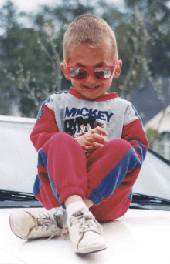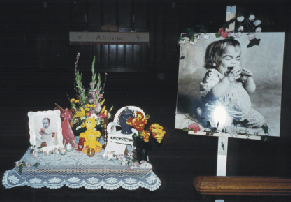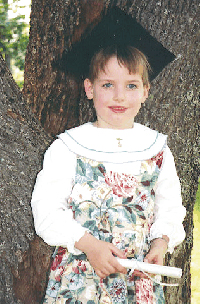Our Donors Speak Out
 Ann, a registered donor tells us...
Ann, a registered donor tells us...
I am the parent of a child born with severe hydrocephalus. Jeffrey's diagnosis came before birth and changed the lives of those around him forever. By the time he was delivered, his brain had been badly compressed and there were questions about whether his brain developed normally.
Despite a devastating early prognosis, Jeffrey's development has been exceptional. Many have called him a miracle and yet we face many uncertainties in Jeffrey's future as do all people affected by this disorder.
Our decision to register Jeffrey and other members of the immediate family as brain donors is not a decision about death; it is a decision about life. I hope that one day there are many more children just like Jeffrey, children who have beaten the enormous odds against them, children who enjoy good health and normal development despite the diagnosis of hydrocephalus.
I am asking that you consider the opportunity to register as a donor assuring you that this is a commitment I also have made.
Linda B., a registered donor tells us...
My husband and I donated our daughter's organs to research. I would like to tell you the story of how we came to that decision and about the actual donation itself.
 Our daughter, Ivy, was born with Hurler's Syndrome-- a fatal genetic disease that affects every cell, every organ in the body. We discovered Ivy had Hurler's at seven months of age. Ivy developed mentally and physically to the level of a 2-1/2 year old. We had the privilege of having a 2 year old for 6-1/2 years. How wonderful that was! By the time Ivy was four years old, she required round-the-clock nursing care, was oxygen dependent, blind, stopped walking, lost muscle tone, had limited vocabulary, was on heart and respiratory medication, breathing treatments and antibiotics. What a mouthful, and how grim it all sounds. On the positive side, she still had her hearing and her smile, Ivy loved life, and we loved her. She loved to laugh and sing. When she couldn't remember the words, she laughed at herself. Ivy was the queen in our house, and we were her loyal subjects. We were determined to give her the best quality of life for as long as we could. We decided early on in her disease to have Ivy die at home. Our pediatrician and nurses supported us in our decision.
Our daughter, Ivy, was born with Hurler's Syndrome-- a fatal genetic disease that affects every cell, every organ in the body. We discovered Ivy had Hurler's at seven months of age. Ivy developed mentally and physically to the level of a 2-1/2 year old. We had the privilege of having a 2 year old for 6-1/2 years. How wonderful that was! By the time Ivy was four years old, she required round-the-clock nursing care, was oxygen dependent, blind, stopped walking, lost muscle tone, had limited vocabulary, was on heart and respiratory medication, breathing treatments and antibiotics. What a mouthful, and how grim it all sounds. On the positive side, she still had her hearing and her smile, Ivy loved life, and we loved her. She loved to laugh and sing. When she couldn't remember the words, she laughed at herself. Ivy was the queen in our house, and we were her loyal subjects. We were determined to give her the best quality of life for as long as we could. We decided early on in her disease to have Ivy die at home. Our pediatrician and nurses supported us in our decision.
When Ivy was about four years old, I began thinking how it would be for me when Ivy died. We decided on cremation for Ivy. I personally felt the need to think and act on the details of he death before she died. I needed to be able to have it all thought out. I went about the process of imagining the details of what needed to be done after she died. I spent days looking for the perfect urn, a beautiful pale blue urn, and I found a little white wicker chair to place the urn in, and some lovely rose-scented candles that I imagined would surround her chair and urn. I made arrangements to borrow a very large photograph of Ivy that hung in the teacher's lounge of her developmental center. So I had these things put away and it meant a lot that I had done this. I no longer had to think about it, and I moved on to the next step in my process. It was as if I had been divinely guided. I kept thinking that it was a shame that Ivy couldn't be an organ donor. My husband and I are organ donors and I would have felt such peace and happiness if Ivy could have helped another live. What an honor it would be do do that.
I discovered a way that Ivy could help research and perhaps one day help save another child's life if a cure could be found. I read about a brain and tissue bank in Maryland that was looking for donors. I called them and began asking questions about the process and what it entailed. Everyone I spoke with was very kind and compassionate. It required a bit of organizing and a great deal to think about, because to donate one's body to research, let alone my beautiful Ivy's body, was quite a big deal. I began to imagine Ivy's spirit all around the United States in research centers helping to solve the mysteries of this awful disease. It took a great deal of courage on my part to set this up. We could change our mind at the last minute, should our courage fail us upon her death. I say this because an autopsy needed to be performed to collect Ivy's organs very soon after death. I knew that this would be difficult for me, but God was guiding me in the process and I trusted Him completely. He would not give me the opportunity if He felt that I would change my mind. I also knew He would not pass judgment on me if I did. So when Ivy passed away peacefully in the arms of her mother and father at home, we did, indeed, proceed with the organ donation.
I would like to tell you a little about that process and how it was for me. In order to harvest the organs, you are allowed only a few hours with your child, because the organs deteriorate quickly. We all spent our time with Ivy and said our good-byes in our own way. Our courageous nurse made the appropriate calls to the doctor, tissue bank, and the pathologist who would be performing the autopsy donation. The doctor came to our home, pronounced her dead and signed the appropriate documents.
We gently cut some curls from Ivy's hair for remembrance and carefully wrapped her in her favorite blanket and drove her ourselves to the hospital for the donation. You know, it was really helpful for me to carry my dead baby around in my arms. My husband and I took turns. It seemed to help. People kept wanting to take her from us, but we insisted that we carry her room to room until it was truly time to let her go. After the donation, we carried her home and made arrangements to take her to the crematorium. Once again, it was suggested that they would collect her for us. We wanted to do it ourselves. I held her in my arms one more time as we drove all together to the crematorium. When we got there, we gently placed her in their care and finally said our loving good-byes. I can't tell you how empowering it felt to do that ourselves.
She came from my body and never left my side until her cremation. I needed to do it and I just wanted to tell you about it. I now imagine the spirit of my angel busy at work around the country in research labs, trying to find a cure for this disease. I pray each night that she will succeed.
So, if anyone reading this is interested in donating your child's organs, I encourage you to do so. It has been three years since her death, and my husband and I continue to believe we did the right thing for our family.
Linda and Bertie, tell us about Eileen...
 I was overjoyed when I gave birth to a baby girl. Eileen was a very normal little baby and I was shocked when she had a 25 minutes long status seizure at seven months of age. Eileen fully recovered and kept on doing ordinary baby things, but she continued having status seizures every few weeks. As time went on the seizures started to change; Eileen would have a few jumps before proceeding into a full seizure, or she would have strange staring spells. Just before Eileen turned one year old, she had a status seizure that only affected half of her body, two weeks later, she had a status seizure that only affected the other half of her body.
I was overjoyed when I gave birth to a baby girl. Eileen was a very normal little baby and I was shocked when she had a 25 minutes long status seizure at seven months of age. Eileen fully recovered and kept on doing ordinary baby things, but she continued having status seizures every few weeks. As time went on the seizures started to change; Eileen would have a few jumps before proceeding into a full seizure, or she would have strange staring spells. Just before Eileen turned one year old, she had a status seizure that only affected half of her body, two weeks later, she had a status seizure that only affected the other half of her body.
As frightened as my husband and I were by the seizures, the scariest thing was that Eileen, who had 'normal' intelligence at one year, deteriorated down to the level of a six month old baby at fifteen months. This was when we learned of Eileen's diagnosis, severe myoclonic epilepsy of infancy (also known as severe polymorphic epilepsy). My husband and I started to research this area and discovered that there was no effective treatment for Eileen's condition, and most individuals with this disorder did not live into adulthood.
Research into this area was very scarce, but it also gave us some hope; Eileen would be able to learn to do some things and although her seizure types would change, the seizures would become less frequent.
Eileen regained her learning ability. She became a proficient crawler once again and she started walking at 19 months. We had started potty training Eileen's sister and Eileen was determined to do whatever her sister was doing. We were overjoyed when Eileen had potty trained herself prior to 2 1/2 years.
Eileen had the kindest and most loving personality that a child could have. She spent most of her life at the mental level of a 2 1/2 year old. Eileen loved going to school (thoroughly enjoyed the bus ride), going swimming, grocery shopping and going for car rides (she would ask for her 'tape'; if we didn't have it playing). Eileen loved to eat; cheese and crackers were her favorite snack and she enjoyed orange juice. She never really developed a sweet tooth, although she loved pop ("Coca-Cola" was her favorite). Eileen had developed an extensive vocabulary and loved talking to everybody. Eileen would chirp "Hello there!" when she met someone, wait a few seconds and then say "Fine". Eileen would give you a great big hug if she thought that you were friendly. Eileen would tell you that she was "Happy" and she would love to play with her toys, games and dolls. Eileen enjoyed singing, make believe and watching TV game shows. She cheered when somebody won a car on "The Price is Right". Eileen would pick up the telephone if we watched "Who Wants to be a Millionaire"; we would ask who she wanted to talk to, and Eileen would say "Regis". She became so excited when a contestant would call an "E" on "The Wheel of Fortune" that she would rush over to the TV, point to the TV and say "Eileen". She was filled with the joy of living life to it's fullest. Everyday with Eileen was a joyful event.
We spent Eileen's days enjoying her thoroughly, but we knew that her time with us was limited. We were determined to give Eileen the best quality of life. We made the decision to donate Eileen's brain tissue about two years before she died. I had noticed an article in a magazine and knew that it was something that we had to do. Every human being will die; accepting death is easier if you know that your life has some purpose or meaning. We made the decision that I am sure Eileen would have made if she had been able. We knew that she felt awful after a seizure. Eileen accepted her doctor's visits, therapy sessions, hospitalizations and medication without complaint. Eileen loved people so much that she would not want another person to go through what she did.
The big seizure came late on a Friday night. Eileen seized for about five minutes, paused for a few seconds to gasp for air, then continued to seizure. Her little body was turning blue. Eileen was rushed to the emergency department. Eileen died several days later, despite the best efforts of everyone involved. Eileen's death has been a huge loss in our lives. The thought that there is a little bit of Eileen out in the world, ready to help people, is very comforting. We did not expect Eileen to die so soon; but I am glad that we had prepared in advance for the tissue donation, as this allowed the medical team to collect the tissue properly so that the tissue could give the greatest benefit. Nothing can properly prepare a person for the death of their own child, but thinking about it in advance takes many of the 'should haves' away. We have no regrets for the life we had with Eileen. She is now our little angel, working hard to make people happy.
 Barb and Debra Tell us about Scott
Barb and Debra Tell us about Scott
As Scott's parents we have been blessed to have him in our lives. His brother and sister also know we were very fortunate that he blessed their lives. Scott was such a good kid...always thinking of others. He also was gentle. He loved animals in a mystical way. He told me once life was a big fish bowl. We were all animals of God. Some people believe that and say creatures of God.
We realized a few years ago when it sunk in that we would eventually loose Scott, that no one should go through this. No family or person. We then decided that Scott's body (brain and tissue) should be used for research. Scott's spirit is running free of the ravages of his illness. We were also told a cure for Niemann-Pick Type C (NPC) would bring researchers closer to cures of many other diseases, because of some of the common links.
Scott's body was only the vessel that carried his spirit though this world. It is not truly Scott. So use of the body parts for research would help, maybe many people. So Scott lives on. That is why I am so concerned that the researchers are aware of his gift to them. He can physically be part of the cure.
It is also very cool that he is at University of Maryland...Fear the turtle. We live in Rhode Island...and Scott made me stop many times to take a turtle off the road, so it wouldn't get run over. He had a love for nature and just maybe he can help find a cure for NPC.
